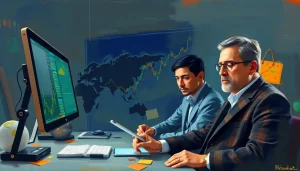From losing your life savings to building generational wealth, the path you choose for learning futures trading can make all the difference between catastrophic failure and sustainable success. The world of futures trading is a complex and dynamic landscape, where fortunes can be made or lost in the blink of an eye. It’s a realm that demands not just knowledge, but a deep understanding of market mechanics, risk management, and psychological resilience.
Futures trading, at its core, is a financial contract where two parties agree to buy or sell an asset at a predetermined price on a specific future date. This seemingly simple concept opens up a world of opportunities for traders to speculate on price movements, hedge against risks, and potentially reap significant rewards. However, the flip side of this coin is the inherent risk that comes with trading in leveraged instruments.
This is precisely why proper training is not just beneficial, but absolutely crucial for anyone looking to venture into the futures market. Without a solid foundation of knowledge and skills, even the most well-intentioned trader can quickly find themselves in over their head, facing losses that could have been avoided with the right education.
The Importance of Quality Education in Futures Trading
Imagine stepping onto a high-wire without any training or safety net – that’s essentially what entering the futures market without proper education is like. The stakes are high, and the consequences of missteps can be severe. This is why investing in a quality futures trading course is not just advisable, it’s essential for long-term success.
But what should you look for in a futures trading course? First and foremost, comprehensive coverage of the basics is non-negotiable. A good course should cover everything from market structure and order types to contract specifications and margin requirements. Beyond the fundamentals, look for courses that delve into advanced topics like technical analysis, risk management strategies, and trading psychology.
The instructor’s credentials and real-world trading experience are also crucial factors to consider. After all, would you want to learn brain surgery from someone who’s only read about it in books? The same principle applies to trading education. Seek out instructors who have been in the trenches, who have experienced both the highs and lows of trading, and can offer practical insights beyond theoretical knowledge.
Lastly, consider the learning format and support system offered by the course. Does it align with your learning style? Is there ongoing support after the course ends? These factors can significantly impact how well you absorb and apply the knowledge gained.
Online vs. In-Person Futures Trading Courses: Weighing Your Options
In today’s digital age, aspiring traders have the luxury of choosing between online and in-person futures trading courses. Each option comes with its own set of advantages and drawbacks, and the right choice depends on your individual circumstances, learning style, and goals.
Online courses offer unparalleled flexibility. You can learn at your own pace, revisit lessons as needed, and fit your studies around your existing commitments. This is particularly beneficial for those balancing full-time jobs or family responsibilities with their trading education. Moreover, online courses often provide access to a wealth of resources, including recorded lectures, interactive quizzes, and trading simulators.
However, the self-paced nature of online learning requires a high level of self-discipline and motivation. Without the structure of scheduled classes and face-to-face interactions, some learners may find it challenging to stay on track. Additionally, the lack of real-time feedback and personal interaction with instructors and peers can be a drawback for those who thrive in collaborative learning environments.
On the flip side, in-person futures trading courses offer a more immersive and interactive learning experience. The ability to ask questions in real-time, engage in group discussions, and network with fellow traders can be invaluable. The structured environment of classroom learning can also help maintain focus and motivation.
However, in-person courses come with their own set of challenges. They often require a significant time commitment and may not be as flexible as online options. Travel costs and fixed schedules can also be potential hurdles for some learners.
When choosing between online and in-person options, consider factors such as your learning style, time availability, budget, and the specific skills you want to develop. Some traders find that a combination of both online and in-person learning provides the best of both worlds.
Top Online Futures Trading Courses: A Deep Dive
In the vast sea of online futures trading courses, a few stand out for their comprehensive curriculum, expert instruction, and positive user reviews. Let’s explore three top contenders that have garnered praise from both novice and experienced traders.
Course 1: The “Futures Trading Mastery Program” by TradePro Academy has gained a reputation for its in-depth coverage of futures trading strategies and risk management techniques. The course is structured as a 12-week program, combining video lessons, live trading sessions, and weekly Q&A calls with experienced instructors.
What sets this course apart is its focus on practical application. Students have access to a state-of-the-art trading simulator, allowing them to practice strategies in a risk-free environment. The curriculum covers everything from basic chart reading to advanced order flow analysis and market profile concepts.
User reviews consistently praise the course for its comprehensive content and the instructors’ ability to break down complex concepts into digestible pieces. Many students report significant improvements in their trading performance after completing the program.
Course 2: “Advanced Futures Trading” offered by Online Trading Academy is another highly regarded option, particularly for those looking to take their trading to the next level. This course is unique in its emphasis on institutional trading techniques and order flow analysis.
The instructors, all professional traders with years of experience, provide insights into how large institutions move the markets and how retail traders can capitalize on these movements. The course also includes a module on developing and backtesting algorithmic trading strategies, catering to those interested in automated trading.
While the course is on the pricier side, many students find the investment worthwhile, citing the depth of knowledge gained and the potential for long-term trading success. The course also offers lifetime access to course materials and regular strategy update webinars, providing ongoing value long after the initial training is complete.
Course 3: For those looking for a more budget-friendly option without compromising on quality, “Futures Trading Fundamentals” by Warrior Trading offers an excellent starting point. Led by Ross Cameron, a well-known figure in the day trading community, this course focuses on building a solid foundation in futures trading.
The curriculum covers key concepts such as contract specifications, margin requirements, and basic charting techniques. What sets this course apart is its emphasis on risk management and developing a trader’s mindset – crucial aspects often overlooked in technical-focused courses.
While not as comprehensive as some higher-priced options, this course provides excellent value for money, especially for beginners. Many students appreciate the clear, no-nonsense teaching style and the supportive community of fellow traders.
When comparing pricing and value for money, it’s important to consider not just the upfront cost, but also the potential long-term benefits. A more expensive course that provides comprehensive knowledge and ongoing support might offer better value than a cheaper option that leaves gaps in your understanding. Ultimately, the best course for you will depend on your current skill level, learning goals, and budget.
Best In-Person Futures Trading Courses: The Immersive Experience
While online courses offer convenience and flexibility, in-person futures trading courses provide a unique, immersive learning experience that some traders find invaluable. Let’s explore three top-tier in-person courses that have garnered praise for their comprehensive curriculum and hands-on approach.
Course 1: The “Professional Futures Trader Program” offered by the Chicago Trading Group is a five-day intensive course held in the heart of Chicago’s financial district. This program stands out for its location and the hands-on experience it provides. Participants get to witness live trading action on the Chicago Mercantile Exchange floor, providing an unparalleled insight into the fast-paced world of futures trading.
The course covers a wide range of topics, from basic market mechanics to advanced trading strategies. What sets it apart is the emphasis on practical application. Participants spend a significant portion of the course in simulated trading sessions, applying the concepts they’ve learned in real-time market conditions.
One of the major advantages of this course is the networking opportunities it provides. Participants get to interact with professional traders, exchange officials, and other industry insiders. These connections can prove invaluable for those looking to build a career in futures trading.
Course 2: For those seeking a more extended, immersive experience, the “Six-Week Intensive Futures Trading Program” by Market Traders Institute in Orlando, Florida, is worth considering. This course is known for its comprehensive curriculum and the strong industry connections it offers.
The program covers all aspects of futures trading, from fundamental and technical analysis to advanced risk management strategies. What sets this course apart is its focus on developing a complete trading plan. By the end of the six weeks, participants have a fully-fledged trading strategy that they’ve developed and back-tested under expert guidance.
The course also includes field trips to brokerage firms and meetings with successful traders, providing valuable insights into the day-to-day realities of professional trading. Many participants find these networking opportunities to be one of the most valuable aspects of the course.
Course 3: For traders looking to specialize in a particular area of futures trading, the “Advanced Energy Futures Trading” course offered by the Energy Management Institute in Houston, Texas, is a standout option. This three-day intensive course focuses specifically on trading energy futures, including oil, natural gas, and electricity.
The course is led by industry veterans with decades of experience in energy trading. It covers not just trading strategies, but also provides in-depth knowledge of the energy markets, including supply and demand dynamics, regulatory issues, and geopolitical factors that influence energy prices.
What makes this course unique is its specialized focus. For traders looking to carve out a niche in energy futures, the depth of knowledge provided is unparalleled. The course also includes a simulated trading competition, allowing participants to put their newly acquired knowledge to the test in a risk-free environment.
When considering in-person courses, it’s important to factor in additional costs such as travel and accommodation. However, for many traders, the benefits of face-to-face instruction, networking opportunities, and immersive learning experiences outweigh these extra expenses.
Specialized Futures Trading Courses: Niche Knowledge for Niche Markets
As you delve deeper into the world of futures trading, you might find yourself drawn to specific markets or trading styles. This is where specialized futures trading courses come into play, offering focused knowledge and strategies for particular niches within the broader futures market.
Commodity-specific courses are a prime example of this specialization. For instance, the “Agricultural Futures and Options” course offered by the CME Group provides in-depth knowledge about trading grain, livestock, and other agricultural products. This course covers not just trading strategies, but also the fundamental factors that drive these markets, such as weather patterns, crop reports, and global supply and demand dynamics.
Similarly, courses focused on energy or metals futures delve into the unique characteristics of these markets. The “Mastering Metals Trading” course by the London Metal Exchange, for example, offers specialized knowledge on trading base metals futures, covering topics like contango and backwardation, warehouse stocks, and the impact of industrial demand on prices.
For traders more interested in the technical aspects of futures trading, there are courses that focus exclusively on technical analysis. The “Advanced Technical Analysis for Futures Traders” course offered by TradingView is a prime example. This course goes beyond basic chart patterns and indicators, delving into advanced concepts like Elliott Wave Theory, Fibonacci analysis, and Market Profile.
Risk management and trading psychology are crucial aspects of successful futures trading, and there are courses dedicated specifically to these topics. The “Master Your Trading Psychology” course by Trading Composure, for instance, focuses on developing the mental resilience and emotional control necessary for consistent trading performance. It covers topics like dealing with losses, maintaining discipline, and developing a growth mindset.
In the rapidly evolving world of algorithmic and automated trading, specialized courses are becoming increasingly popular. The “Python for Algorithmic Trading” course offered by QuantInsti is an excellent example. This course teaches traders how to develop, backtest, and implement trading algorithms using Python, a skill that’s becoming increasingly valuable in today’s technology-driven markets.
These specialized courses offer several advantages. They allow traders to develop expertise in specific areas, potentially giving them an edge in niche markets. They also provide opportunities for traders to diversify their skills and explore new areas of the futures market.
However, it’s important to note that these specialized courses are often most beneficial for traders who already have a solid foundation in futures trading basics. They’re designed to build upon existing knowledge rather than provide a comprehensive introduction to futures trading.
Evaluating the Effectiveness of Futures Trading Courses
With the plethora of futures trading courses available, how can you determine which ones truly deliver value? Evaluating the effectiveness of these courses is crucial to ensure you’re investing your time and money wisely.
Key performance indicators (KPIs) for course success can vary depending on individual goals, but some common metrics include:
1. Improvement in trading performance: This could be measured through increased profitability, reduced drawdowns, or more consistent returns.
2. Enhanced market understanding: A good course should significantly improve your comprehension of market mechanics, price action, and fundamental factors affecting futures markets.
3. Development of a robust trading plan: By the end of the course, you should have a clear, well-defined trading strategy that aligns with your goals and risk tolerance.
4. Increased confidence in decision-making: Effective courses empower traders to make informed decisions based on sound analysis rather than emotion or guesswork.
Student testimonials and success stories can provide valuable insights into a course’s effectiveness. Look for detailed reviews that go beyond generic praise and describe specific ways the course improved the student’s trading. Be wary of courses that only showcase spectacular success stories – remember, consistent, sustainable results are more indicative of a course’s true value than occasional big wins.
Post-course support and community engagement are often overlooked aspects of trading education, but they can significantly impact long-term success. The best courses offer ongoing support through forums, regular Q&A sessions, or mentoring programs. These resources allow students to continue learning and adapting their strategies as they encounter real-world trading challenges.
For instance, the “Futures Trading Mastery” course by SMB Capital offers lifetime access to a private community of traders, where students can share ideas, discuss market conditions, and get feedback on their trades. This ongoing support can be invaluable, especially for newer traders navigating the complexities of the futures market.
Continuing education and advanced learning opportunities are another hallmark of effective trading courses. The financial markets are constantly evolving, and the best educators recognize the need for ongoing learning. Look for courses that offer regular strategy updates, advanced modules, or partnerships with other educational providers to help you continue growing as a trader.
For example, the Online Trading Academy offers a tiered learning path, with courses ranging from beginner to advanced levels. This allows traders to progressively build their skills and knowledge over time, adapting to changing market conditions and personal goals.
It’s also worth considering how well a course integrates with other learning resources. Does it complement the knowledge gained from future trading books or other educational materials? A well-rounded trading education often combines insights from various sources, so courses that encourage this holistic approach to learning can be particularly valuable.
Remember, the true measure of a course’s effectiveness is not just what you learn during the program, but how well you can apply that knowledge to achieve your trading goals. The best courses provide not just information, but the tools and support needed to translate that information into practical trading skills.
Charting Your Path to Futures Trading Success
As we wrap up our exploration of the best futures trading courses, it’s clear that the path to trading success is as diverse as the traders who walk it. From comprehensive online programs to specialized in-person intensives, the options for futures trading education are vast and varied.
We’ve delved into the merits of online courses like the “Futures Trading Mastery Program” by TradePro Academy and the “Advanced Futures Trading” course by Online Trading Academy, which offer flexibility and depth of content. We’ve explored immersive in-person experiences like the “Professional Futures Trader Program” in Chicago and the “Six-Week Intensive Futures Trading Program” in Orlando, which provide hands-on learning and invaluable networking opportunities.
We’ve also touched on specialized courses catering to niche markets and specific trading styles, from commodity-focused programs to courses on algorithmic trading. These specialized offerings allow traders to develop expertise in particular areas of the futures market, potentially giving them a competitive edge.
The importance of choosing the right course for your individual needs cannot be overstated. Your choice should align with your current skill level, learning style, career goals, and available resources. A course that’s perfect for a beginner might not offer enough depth for an experienced trader looking to refine their skills. Conversely, an advanced course might overwhelm a newcomer to the futures market.
As you evaluate your options, consider factors like the course curriculum, instructor credentials, learning format, and post-course support. Look for programs that not only teach trading strategies but also emphasize risk management and psychological preparation – two critical aspects of successful trading often overlooked by less comprehensive courses.
Remember, investing in your education is investing in your future as a trader. While quality courses may come with a significant price tag, the knowledge and skills gained can pay dividends throughout your trading career. As the saying goes, “The only thing more expensive than education is ignorance,” and this is particularly true in the high-stakes world of futures trading.
Moreover, your education doesn’t end with the completion of a course. The most successful traders are those who commit to lifelong learning, constantly adapting their strategies to changing market conditions. Look for courses that encourage this mindset and provide resources for ongoing education and skill development.
Whether you’re just starting your journey in futures trading or looking to take your skills to the next level, there’s a course out there that can help you achieve your goals. By carefully evaluating your options and choosing a program that aligns with your needs and aspirations, you’re taking a crucial step towards becoming a successful futures trader.
In conclusion, the path from novice to proficient futures trader is rarely a straight line. It’s a journey of continuous learning, adaptation, and personal growth. The right education can provide you with the knowledge, skills, and confidence needed to navigate the complex world of futures trading. So take the time to research your options, invest wisely in your education, and remember – in the world of trading, knowledge truly is power.
As you embark on or continue your futures trading journey, consider complementing your course-based learning with other educational resources. Explore the best books on futures trading to deepen your understanding, investigate futures trading jobs to understand career possibilities in this field, and delve into specific strategies like forex futures trading or TradeStation futures trading to broaden your trading repertoire.
Remember, the journey of a thousand pips begins with a single trade. With the right education, dedication, and perseverance, you can transform your trading aspirations into reality. Happy trading!
References:
1. Chicago Mercantile Exchange Group. (2021). “Agricultural Futures and Options.” CME Group Education. Available at: https://www.cmegroup.com/education/courses/introduction-to-futures/agricultural-futures-and-options.html
2. London Metal Exchange. (2022). “Mastering Metals Trading.” LME Education.
3. TradingView. (2023). “Advanced Technical Analysis for Futures Traders.” TradingView Courses.
4. Trading Composure. (2022). “Master Your Trading Psychology.” Trading Composure Courses.
5. QuantInsti. (2023). “Python for Algorithmic Trading.” QuantInsti Courses. Available at: https://www.quantinsti











Would you like to add any comments? (optional)